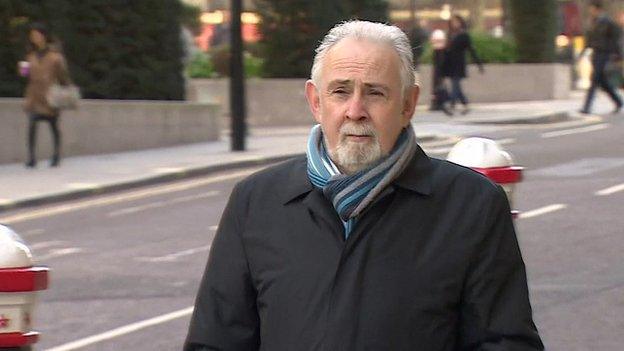On the Runs: Secret deal hidden in plain sight
- Published
- comments

The collapse of the trial of John Downey, who was accused of the 1982 Hyde Park bombing, has focussed attention on one particular element of a long and convoluted peace process
The Police Service of Northern Ireland codenamed their processing of republican On The Runs "Operation Rapid".
The same nickname could have been applied to this week's fast moving political crisis.
During a 24-hour period it looked like we were heading back to the David Trimble era, when the former first minister's frequent resignations brought the Northern Ireland Assembly to a shuddering halt.
Then David Cameron's swift offer of a judge led-inquiry brought Stormont back from the brink, with Peter Robinson deciding he had got enough to withdraw his threat to quit.
Arguments abound over whether the Democratic Unionist Party (DUP) secured a victory, or settled for less than they had demanded.
The truth
It is not the "full judicial inquiry" the first minister wanted, as the judge will not have the power to compel unwilling witnesses to testify, nor will he or she hold public hearings.
The critics argue it is a worthless paper exercise. However, DUP sources say the judge's access to government files and ability to interview officials and police officers should be enough to establish the truth.
If the first minister does not get satisfaction by the time the judge reports at the end of May, Mr Robinson has pledged to pursue the matter further.
While republicans insist unionists knew all about what was happening to the On The Runs, that is not strictly true.
'Invisible process'
Senior PSNI officers answered some questions posed by Northern Ireland Policing Board members and the scheme got a glancing reference in the voluminous Eames-Bradley report on dealing with the legacy of the Troubles.
But when former Northern Ireland Secretary of State Peter Hain withdrew his controversial On The Runs bill at Westminster, he never made a speech telling MPs that, in the absence of a special law, he would continue with an administrative scheme in any case.
To that extent the On the Runs were handled by "an invisible process", a quote Mr Justice Sweeney's Downey judgement attributes to Sinn Féin President Gerry Adams.
Just to confuse matters, some elements of the tale of the On The Runs appear to have been hidden in plain sight.
Royal pardons
For example we had quite a stir this week about the mention in the Downey judgment that the Queen had been involved through granting some republican fugitives pardons.
But if you trawl through the archive of the BBC website you can find four such "Royal Prerogatives" openly reported 14 years ago, external, with a comment from the former Northern Ireland Secretary Peter Mandelson that convicted terrorists living outside the province would not be pursued.
The truth is the peace process has been long and convoluted and items which are top of the agenda one week appear to have less immediate resonance the next.
Sinn Féin's special advisers are a case in point.
The party appointed former IRA prisoners as ministerial aides going back to the year 2000, but the issue only captured widespread and persistent media attention when it was revealed that one of them had been jailed for her part in the murder of magistrate's daughter Mary Travers.
Similarly, the On the Runs might seem yet another item in a list of peace process issues until you put a particular face - John Downey's - and a particular atrocity - the Hyde Park bombing - to the controversy.
The County Donegal man denied murdering four soldiers in the 1982 IRA attack, before his trial collapsed last week.
Paramilitary fugitives
Next week, MLAs are back to debating electricity prices and arrangements for pavement cafes. The dust may settle, but we are not in the same place we were last week.
What remains of the Haass process seems irreparably damaged, while the party leaders' trip to Washington DC this St. Patrick's Day now holds out no realistic chance of progress.
The On the Runs judicial report, due at the end of May, could provide more clarity.
But if a list of names enter the public domain then you can expect much more publicity about the paramilitary fugitives, as politicians and reporters try to determine why exactly these individuals felt the need to contact the authorities to check if they were wanted.